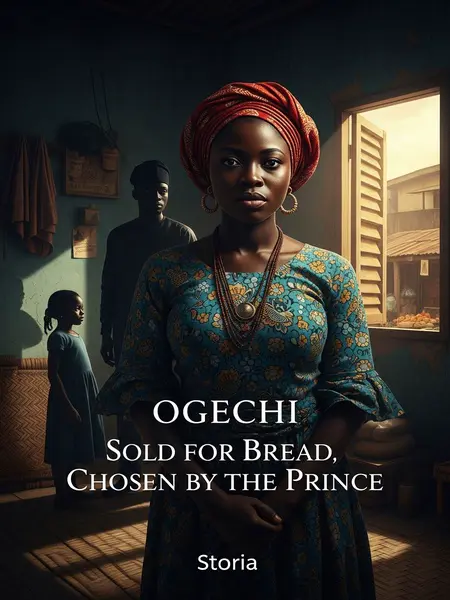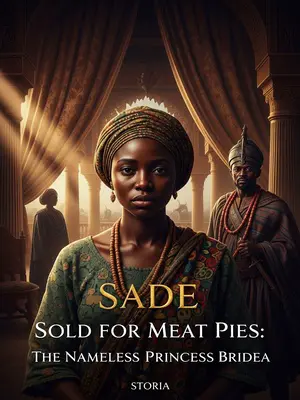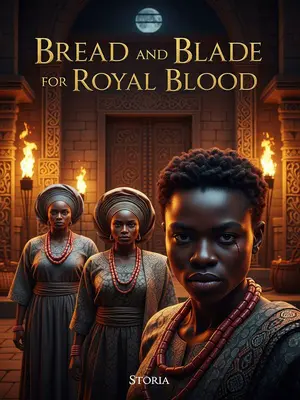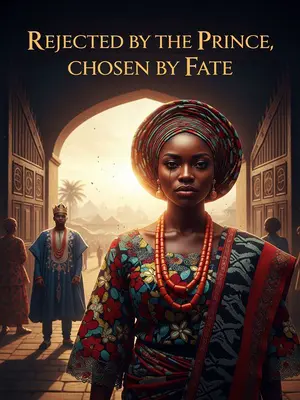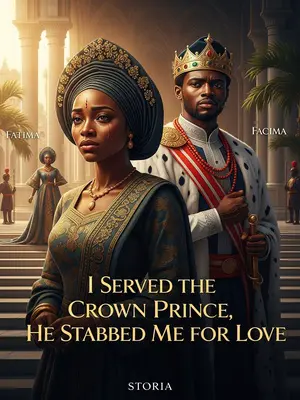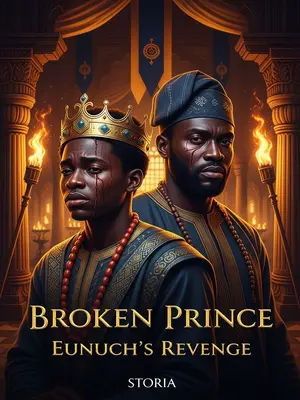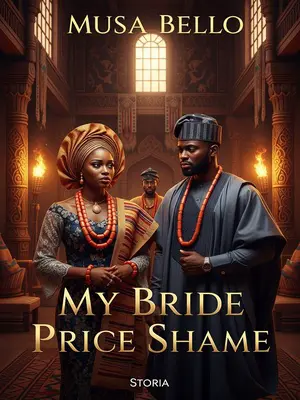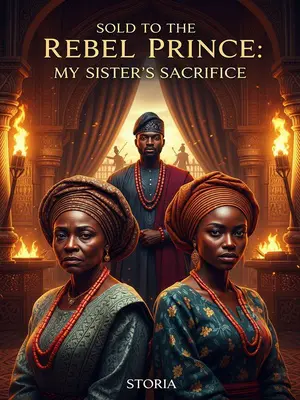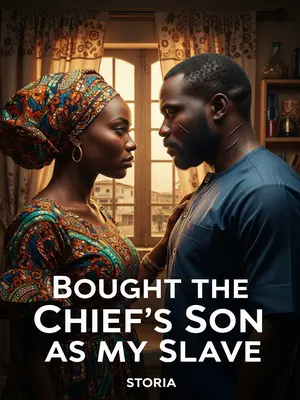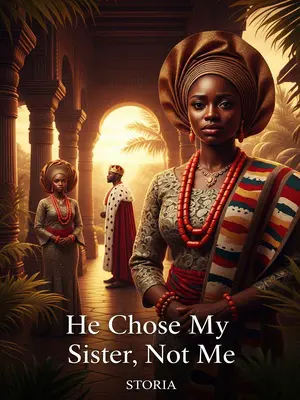Chapter 1: Leaving Umuola
Dust swirl for evening light as I stand by the cracked edge of our field, watch my papa shadow long for ground. Him bend back for that farm like say him dey do sacrifice for our ancestors. No matter how sweat soak him shirt, the yam and cassava no dey reach to fill the ten bellies wey dey our compound.
Sometimes for dusk, I go see papa lean on him hoe, eye heavy with worry, mouth dey move as he pray to Chukwu—make God open hand for us. Goat dey cry for far, hungry like us. For Umuola, everybody sabi Nwosu family: stubborn spirit, empty barn.
Grandpa and grandma old, their eyes full story. Three uncles—grown men—never marry. Every day, dem just waka round village, dey gist and scratch leg, nothing serious—idle men, I no go lie.
Dem go dey shout from far: "Who get better yam mound pass me? Who go marry first?" But na just mouth. Sometimes Mama go hiss, cross her arm, mutter, "If to say hand dey pain una, una for find work, no be to waka round dey shake leg." Neighbours go laugh, but for inside our compound, wahala dey heavy.
My small aunty and me na age mates, she be apple for grandpapa eye.
Even when food no dey, grandpa go sneak roasted maize give her, whisper, "Chidinma, eat before your mama see." I go just look, sometimes small jealousy dey bite me, but I no vex.
That year, harmattan come with heavy dust and cold. Food finish for house since days. Our bellies empty, harmattan wind sharp like blade. As hunger wan finish us, my papa travel Aba to find work. Then traffickers enter Umuola. Dem give me four thousand naira, and I sell myself.
My hand shake as I collect the money. I look my mama face—her eye red from cry, lips cracked. I pause, memory of her hands on my head, my siblings faces for night. I swear, the money heavy for my hand pass stone, but I gree.
The day I comot from house, my mama faint from cry. She press her only dowry—a red coral bead—into my palm. I collect two thousand naira for front of everybody, then hide two thousand for her hand.
Mama hand dey shake as she squeeze my own, coral bead warm for my skin. Her tears wet my wrist. Neighbours dey whisper, some dey shake head, others dey watch like market drama.
I tell her, "No matter wetin, make you take care of my small brother and sister well."
She nod, voice dey break: "Ogechi, no fear. I go take care of them. God dey." My small brother hold my wrapper, no gree let go. I drag am gently. My heart dey cut like blade.
Harmattan thick that day. Papa still dey city. Mama stand for wind and cold, my younger siblings for her side, dey see me off. The cold bite, she no even get wrapper.
Her hair full dust, lips dry, but she stand like lioness. As I enter keke napep, her voice still dey my ear: "Ogechi, wherever you go, no forget who you be!"
Keke napep carry me far. I hug my small Ghana-Must-Go, coral bead pressed for my fist. My eyes dey water from wind, and tears wey I no gree let show.
Twelve girls dey, all from our village or next, age mates. Even though traffickers buy us, at least food dey reach. Anybody wey fit sell pikin no dey enjoy life for house.
Night time, we huddle, share stories—who miss mama, who wan run. Sometimes, one dey pray, another dey curse her fate. Life bind us like broom for one bundle.
We dey gist, laugh, talk. Me, I just quiet, no sure where next.
Girls dey dream city—Lagos, Abuja—like heaven. Me, I keep dream small: chop, sleep, wake, make my people survive.
Journey hard, road far—over one month before we reach Makurdi, rainy season don start.
Rain beat us. Lorry leak, everywhere smell of wet ground and sweat. I hold bead, whisper, "I go survive."
Traffickers lock us for small compound. First day, five fine girls carry go. After days, others follow.
As each girl go, we hug, whisper last words. Nobody know if we go see again. Some cry, some just blank.
Me, dem sell to Okafor family for city west side. Okafor house get two courtyards, oga na local government chairman, so dem talk.
Buyers come with big fine car. Driver wear native, shoe dey shine. I dey shiver, but I stand straight—make dem know I strong.
Dem put me for second young lady’s compound as rough maid—sweep, run errand.
Na early morning: sweep yard, fetch water, wash plate. Sometimes, I dey pound yam for madam, or run market. If I do well, small praise: "Ogechi, you try."
Okafor house simple. Madam dey, one second wife—she sef na former maid. All three young masters na madam pikin, dem dey prestigious academy for Jos, only come house once or twice a year.
Festival time, compound dey full, laughter everywhere. Most days, quiet: birds dey sing, mango tree dey shed leaf. Madam dey read paper for veranda.
Three young masters fine, but eldest na real spec—like angel waka enter.
Even drivers dey talk: "That boy na Ajebo, fine like oyibo, but him brain sharp pass all." Any time him waka in, even visitors dey look twice.
Eldest young lady, madam’s daughter, na thirteen. Gentle look, but temper dey. Second young lady, second wife pikin, na seven, round and fair, always dey laugh—real baby of the house, everybody pamper am.
Small madam fit vex, throw slippers, stamp foot if food no sweet—just pikin wahala. Chinyere, the second young lady, dey follow me everywhere, her dimples deep like olobe soup.
Okafor family no dey treat servant bad. Since I enter, I don add weight. Madam dey give two hundred naira monthly salary, bonus for festival. I dey save every kobo, hope say one day I go send home.
Some days, madam go call: "Ogechi, you never chop? Go carry food." Christmas, she give wrapper and small groundnut. Other maids dey tease: "You na madam pikin!"
For me, every day na better day. Compared to home work, this one soft. Free time, I dey learn to tie gele, sew, gist with girls.
Na there I first learn to plait hair, measure cloth. I dey watch Aunty Nkem fit lace for madam head. At night, we gist for backyard, mosquito bite, but laughter plenty.
Eldest young lady love book, poetry. Head maid, Aunty Nkem, get good heart—generous, kind. Any chance, she dey teach us read.
Aunty Nkem go say, "Book na key. If you sabi read, nobody go cheat you." She dey show us letters for sand. Adaora, eldest young lady, go read poem, voice soft like flute.
One day, I hear say one girl wey traffickers carry die for beating. As dem dey talk for village, "If pikin survive market, make e thank God." That day, I kneel, thank God, promise say I no go waste this blessing. I dey pray for the other girls—make their spirit rest. Life hard, but I dey among good people.
But life fit change sharp. When I reach fourteen, I no know which mistake oga make, but government raid Okafor house. Everybody above fifteen, dem carry go cell, except married girls.
That night, siren dey shout, neighbours peep window. Soldiers knock, carry everybody. I hide with Ifunanya for store, heart dey beat like drum.
Night before raid, madam return our service papers, give each ten thousand naira, say make we find way.
Tears for her eye: "You be my own pikin. Take am. If God spare us, we go meet again." I hold the paper, no fit talk.
Okafor family never old for city, so servants dey new. In one night, everybody scatter.
People pack, rush gate. Some dey cry, others just run. That kind fear, e dey shake soul.
I carry all my savings, plan return village. But when I see second young lady, nine years but still behave like baby, my heart no gree.
She curl for bed, eyes big, no sleep. I sit, stroke her hair. She call me "sister"—my chest heavy with tears I no fit cry.
Dem seize Okafor house. Me and second young lady no get where to go, she no fit use her old name, Chinyere. I give her new name: Ifunanya.
I whisper: "Your name na Ifunanya now. You dey safe." She smile, hug me tight. From that night, na me and her against the world.
She be my small sister now. My name be Ogechi, Ogechi Nwosu.
I wear that name like new wrapper, carry her hand wherever we waka. From maid, I become big sister by force.
Okafor family dey inside cell. Even if I spend all my money, I fit no see them. I get to carry Ifunanya survive. To survive, we need food and house.
I waka round city, beg people, price food, price house. I swear, Benue sun no dey play, but I tell myself, "If we survive harmattan, nothing fit break us again."
I strong, no dey fear wahala. For years, I don learn some letters and book work.
I carry my small learning go market, price fish, learn how to talk so dem no cheat me. I dey pray say Aunty Nkem teachings go help me stand.
I rent small boat, start to dey sell palm wine for Benue River. Wine need better food join. For summer and rainy season, I dey sell peppered fish and snail; harmattan, I cook pepper soup to warm body.
I go river bank, talk to fishermen, buy fresh fish. My palm wine dey cold, dey sweet. Old men for river dey hail: "Ogechi, your wine pass all!"
After first year rent, I still make thirty-seven thousand naira.
Na big achievement! I hide money under mat, count am every week, pray nothing go carry am.
At first, Okafor family case hot, like say dem go jail soon. One year pass, no news.
Every day I go cell side, ask for news. Warden dey shake head: "No update." My heart dey up and down, but I learn patience.
I sew thick cloth, trousers, carry wine and food, take Ifunanya visit her papa, mama, brothers, aunty. She happy with new red wrapper and blouse I sew, dey hold my hand dey jump.
As we waka, market women dey hail: "See as you fine! Na your sister sew this? God bless her hand o!" Her laugh dey sweet my belle.
Cell no too tight like last year. I give warden two thousand, him allow us enter.
Money dey open door where mouth no reach. The warden wink: "No spoil ground, just quick am."
Cell dark, smell anyhow. Ifunanya dey fear, hold my hand, eyes big like goat see masquerade. I pat her, tell am I dey here. She smile, dimples show.
I tell story, sing: "Omo lanke, no dey fear. Sister dey."
Whole family dey together. I nearly no recognise madam, oga, aunty—dem don lean, skin yellow, like another person. Of three young masters, only two remain. Eldest no dey. I never know them well before, now I no fit tell who be who.
My chest tight as I look them. Na so life fit turn fine person to shadow.
As for missing one, nobody sabi where e dey.
Other servants for city no fit talk. Rumor full everywhere—some say escape, some say government carry am.
But at least those wey remain still resemble human being.
I thank God for small mercies, whisper prayer: "Chukwu, hold them strong."
Warden open door, give us half hour.
I kneel, greet oga and madam, help Ifunanya clean face. Time dey run, but I hold this small moment tight.
Mat dey corner—na there dem dey sleep.
No pillow, no blanket, just small mat. My heart cut. I promise: if God bless me, I go bring better mat next time.
Ifunanya look her mama and papa, no recognise them. But dem recognise her. As she peep, oga finally call her “Chinyere.”
Name echo for cell, dust rise. Silence. Then, her eyes light up.
She remember her name, look papa, shout, “Papa.” Tears rush, she run enter him arms.
Oga hug her like last yam for dry season. Madam dey cry, aunty cover face. Heavy tears.
Family look, cry.
Tears mix with dust, voices choke. For that small time, wahala disappear.
Oga Okafor no recognise me. More than twelve maids dey house, and him no dey always—how him go remember?
He just nod, try smile. I no vex—big man, many people.
But madam, even though she never reach forty, hair don white like harmattan, face old, still recognise me.
Her eyes red, lips cracked, she look me straight, "Na you? Ogechi?" Voice soft, I feel am for bone.
She squeeze my hand. "Thank you, my pikin."
Ifunanya say, "Mama, na my elder sister be this."
She smile, nod. "God bless you, Ogechi."
"Oga, madam, abeg no vex. I no fit let Second Young Lady use her real name, I dey fear government go find am. I no get choice, na why I make her use my surname, call her Ifunanya."
I bend head, voice low. I dey fear, but my mind strong.
"Which offence dey there, Ogechi? My Okafor family all get case, na only her remain. Everything happen sharp sharp, we no fit hide my pikin. If no be you, who know if she for still dey alive? I no fit thank you finish. Who for think say since Okafor family fall, not even one relative show face, na only maid come? Madam return your service paper—you no be servant again. Wetin dey bad if you be Ifunanya elder sister? If Okafor family ever see light again, Ogechi go be young madam for my house."
Madam voice strong. She hold my hand, tears for eye. "Even if world turn, you be our own."
As I see how oga still get hope, my mind rest small. Maybe chance still dey. I happy for Ifunanya. Me, I no even want to be young madam; I just want see my papa and mama, or continue my boat business for Benue River. That one dey okay for me.
I wipe my face, promise myself: whatever happen, I go do my own.
